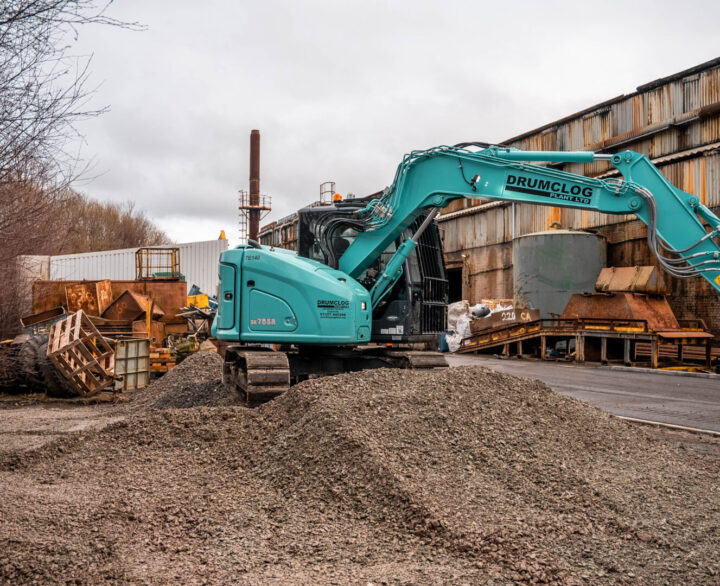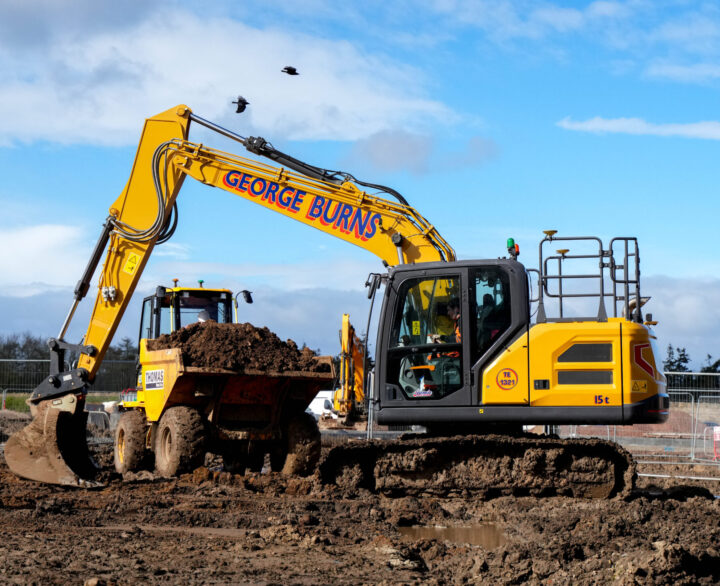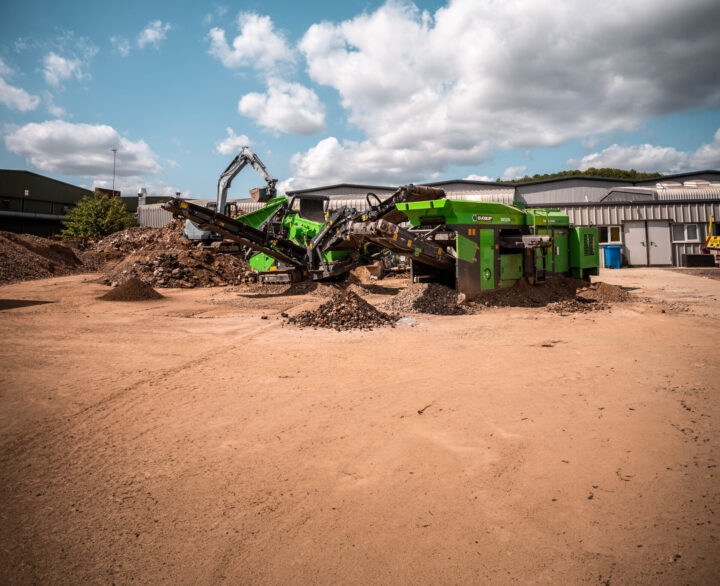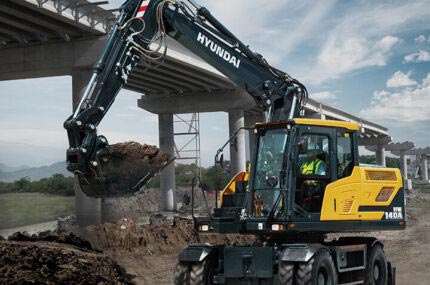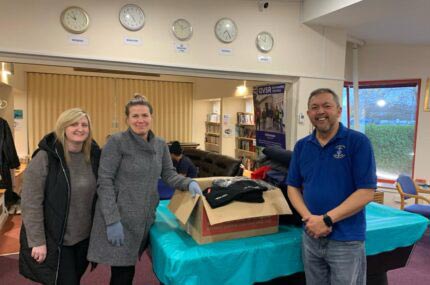Just a stone throw away from Loch Tay lies one of the most picturesque quarrying operations in Scotland.
The quarry is owned and operated by Cross Civils and Construction Services, based in nearby Aberfeldy. Kevin Cross is the Managing Director of the company which, in just five short years, has grown to become one of the biggest multi-disciplined contractors in the region. From a one-man band operation, to employing over thirty people, the company has grown on the back of Kevin’s desire to deliver cost-effective quality workmanship, delivered on time. “We started our operations undertaking small scale construction and civils works, but this has quickly grown into what we are doing today.” Kevin points out. “We now undertake larger, more complex projects, either as main contractor or as a sub-contractor, and this is how we have found ourselves working on a new golf course on the banks of the Tay.”
The new golf course development has seen Kevin and his team undertake a large volume of civil engineering works away from the course itself. Due to the course’s relatively remote location, when the requirement for nearly 100,000 tonnes of sand came out, Kevin needed to look at a multitude of alternatives. “The only way we originally saw feasible was to import all of the material by road. This would have meant 5000 lorry journeys through Aberfeldy, which, at the best of times, isn’t great for traffic. There was also the high transport cost and obviously the huge carbon footprint associated with it.” He explains. “We needed to look at other alternatives and thankfully found one, with a large sand and gravel deposit situated next to the river. This had its own issues, with ecologists and council officials not keen at the outset. However, the sand and gravel deposit lie around 15-20m above the Tay, which meant we were not encroaching on the river itself or digging into the water table, something that pleased everyone. We still had the issue of transporting material to the other side of the river and considered a temporary bridge over the Tay. Again, this was fraught with issues and we eventually agreed on a short, country lane journey away from the populated areas to the satisfaction of all interested parties.”
With planning consent passed, Kevin and his team set about looking for contractors capable of undertaking the project. They eventually decided that it would be best for them to undertake the work themselves and drew up a shopping list of plant and equipment required to fulfil the works.
“We have a small fleet of kit from mini diggers through to 21 tonners for our regular operations.” Kevin commented. “But we knew we needed to upscale for this project. We had the men capable of doing the work and through them and our own enquiries, we decided on taking a look at Finlay Crusher kit for the crushing and screening machines. We already had a relationship with the Molson Young team having taken a couple of mini diggers into the fleet. We knew what they were like to deal with, we knew they were good on the service and back up and we were confident in the quality of the kit they could supply.”
Meeting up with Mike Mackenzie, the local Sales Manager for Molson, they drew up a plan for what was required and what type of products were going to be produced. With an almost definitive list drawn up, the agreement to purchase was made and Kevin started the initial site set up ready to start quarrying.
Planning permission allowed the excavation of 5m of sand and gravel across the entire site to be undertaken. To achieve this the layers of top and sub-soils were removed and stockpiled ready for reinstatement works once the material has been extracted. This allowed access to the aggregates underneath and to dig this material out, Keving opted for a used Kobelco SK300LC-10 excavator. “It’s an ideal size to get in and out of our site and has the capacity we need to get the raw material from the ground at a steady enough rate.” He comments. Sitting on a bench part-way through the cut, the SK300 had a relatively simple life servicing just a single 30t capacity truck taking material up to the crushing and screening operations. “As we are quite limited on space, we can’t process material just to stockpile it.” Kevin explained. “We have to have material going out of the gate to allow us to produce more. With the inclement weather of late it’s been a bit of a challenge balancing things out here as well as on the course construction works. This was another issue we thought we would run into as when we approached local hauliers to transport the material, they all wanted too many clauses in their contracts that could have seriously affected our ability to make money here. To remedy this, we went out and purchased a pair of tippers ourselves. Not only does this allow us to take loads into the course as and when they are required, but it also now gives us the ability to undertake haulage on our own projects as we see fit.”
The majority of material dug out by the SK300 Kobelco excavator was able to be screened straight from the dig, and this work was undertaken by a second Kobelco excavator, this time a new SK210LC-11, which loaded an equally new Finlay 674 inclined screen. The Finlay 674 screener is an ideal aggregate producer thanks to its easily adjustable three deck screen box which provides over 50m2 of screening deck. The 674 is able to be set up and stripped down ready for transport in minutes making it a very versatile tool for short duration jobs. It is also compact when stored ready for transport, a necessity for the roads around the project. The sand and gravel deposit were once part of the former river bend many thousands of years ago and inevitably contained some larger material. This was easily screened out with the resulting fine sand leaving the screen and being stockpiled via a Finlay TC65 tracked conveyor. Using a conveyor allows a larger cone of material to build up and ensures the screening operations can carry on uninterrupted for an entire shift.
The resulting oversized material was moved from the Finlay 674 screener across the site where a 23 tonne Kobelco excavator was feeding a Finlay J1160 jaw crusher. With a potential capacity of over 250 tonnes per hour, the J1170 has been proving its worth processing the river stones extracted from the cut. The jaw on the J1170 can be quickly configured to crush alternative sizes of material should a project have a specific requirement making it a very handy addition to the fleet. Aggregates produced from the river stone are then transferred to the final screening point where a second Finlay 674 three deck screen and TC65 tracked conveyor handle the material.
Loading and stockpiling of the material is handled by a Hyundai HL970CVT. “We were unable to source a suitable low-houred wheeled loader locally and with Molson’s help, we managed to source one from the South West.” Kevin said. “It has been a great tool for us. Economical, powerful and reliable, just what we wanted.”
The Finlay Crusher teams provide Cross Civils with half a dozen different aggregates allowing them not only to meet the requirements of the golf course construction company for sand, but also material suitable for drainage stone and fill stone for the project. “Although this project was primarily designed to bring materials to the golf course development, it has given us the taste for further expansion onto small scale contract crushing operations.” Kevin comments. “We are going to be on site for another 12 months removing the material and reinstating to ground. It has been a very successful project so far, made easier with the help and assistance we have received from the Molson team.”



